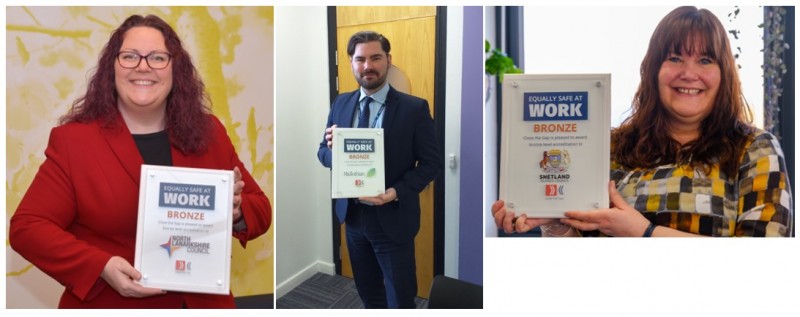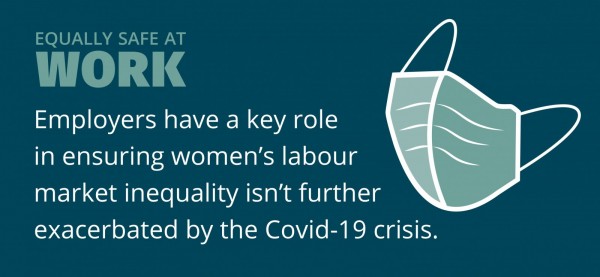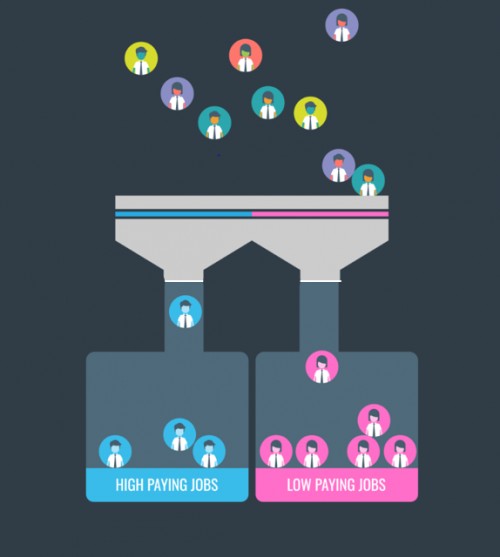Blog
What’s Violence Against Women got to do with women’s labour market inequality? Close the Gap’s new animation explains.
Close the Gap has developed a short animation for Equally Safe at Work that explains the link between violence against women (VAW) and women’s labour market inequality. Tackling women’s inequality in the workplace is a necessary step in preventing VAW, so employers therefore have a key role to play.
We're hiring!
Close the Gap are hiring for three new positions to support the delivery of our Equally Safe at Work employer accreditation programme.
Making sure a green economy also works for women
Prior to the outbreak of the Covid-19, green jobs and green skills were a key aspect of Scottish Government’s efforts to transition to a net zero economy. The ongoing crisis has brought further weight to these considerations, with focus turning to the importance of building a greener and fairer economy in the aftermath of the pandemic.
How will political parties promote gender equality in the labour market? What we learnt from the women’s election hustings
Coverage of the Scottish Parliament elections, which are now only a few weeks away, have been very much focused on COVID-19 and Scotland’s economic recovery. So far, equalities considerations have been notable by their absence. Within mainstream public dialogue and formal televised debates, there has been very little, if any, focus being afforded to promoting gender equality.
One year on: New Close the Gap research highlights the impact of COVID-19 on women’s employment
COVID-19 has had an unprecedented
impact on Scotland’s economy. Women’s labour market participation has been
impacted in multiple and specific ways
by sector shutdowns, furlough, job losses and increases in the amount of unpaid
work, particularly childcare and care.
Close the Gap’s new research, One Year On: The impact of COVID-19 on women’s
employment in Scotland uses labour market data, statistics relating to the Coronavirus
Job Retention Scheme and Self-Employment Income Support Scheme, and Scottish
Government labour market analysis to assess how COVID-19 has impacted women’s
employment and labour market equality over the last 12 months.
Findings from the evaluation of the Equally Safe at Work pilot
Yesterday Close the Gap held an online event to celebrate the success of the Equally Safe at Work pilot and launch the evaluation report for the pilot.
Celebrating the Equally Safe at Work pilot councils

COVID-19 has put health and safety at the heart of fair work, but women’s needs remain under-researched, under-reported and under-compensated
COVID-19 has brought new emphasis to the danger of occupational exposure to disease and injury, leading to increasing focus on health and safety concerns within the context of fair work. These concerns are particularly important for women who account for the majority of key workers, meaning they have greater exposure to the virus in the workplace.
Gender equality can help employers to weather the Covid-19 storm
Women’s employment has been hit hard by Covid-19 and it is highly likely that there may be a loss of female talent in the workplace if employers don’t act to support their female staff. This could drive up costs, including recruitment, training and the loss of experienced staff.
The Gender Pay Gap Manifesto: the 2021 Scottish Parliament elections are an opportunity to realise fair work for women
Close the Gap have now published our manifesto for the 2021 Scottish Parliament election. The Gender Pay Gap manifesto outlines 14 policies that should be adopted over the next parliamentary term to address the gender pay gap and realise fair work for women. In line with the multiple causes of the gender pay gap, the policy priorities cover early learning and childcare, automation, the public sector equality duty, employment practice, occupational segregation, low pay, skills policy, tackling the undervaluation of “women’s work” and economic development.
16 days of activism: Recognising the impact of Covid-19 on women’s experience of gender-based violence.
This week marks the beginning of the 16 days of activism against gender-based violence. The campaign starts on the 25th of November, the International Day for the Elimination of Violence Against Women. The focus of this year’s campaign is the impact Covid-19 has had on women’s experience of gender-based violence. The theme places a strong emphasis on prevention, ensuring essential services for victim-survivors and greater data collection to improve services for victim-survivors.
Equal Pay Day 2020: Why it’s important to look beyond the headline figures
Equal Pay Day is the day from which women are effectively working for free for the rest of the year because of the gender pay gap. Of course it's much earlier in the year for Black and minority ethnic women and disabled women, who experience higher gender pay gaps.
The Living Wage is key if we are to tackle women’s in-work poverty
Living Wage Week is an opportunity to recognise the importance of the Living Wage in tackling women’s poverty and realising fair work for women. Women account for the majority of low-paid workers in Scotland, and two-thirds of workers being paid less than the Living Wage are women. Low pay is a critical factor in the gender pay gap and also reflects the continued undervaluation of “women’s work” in sectors such as social care and childcare.
We're hiring!
Close the Gap is recruiting for the role of Communications and Administration Assistant. The successful applicant will be responsible for co-ordinating Close the Gap social media channels and websites, supporting wider communications work and providing administrative support.
New guidance for local government on supporting women at work during Covid-19

Challenge Poverty Week: What COVID-19 means for young women’s in-work poverty
One of the themes of this year’s
Challenge Poverty Week is work and jobs, with the key message that tackling
poverty requires investment in decent work. This is particularly important for women,
as women’s experience of the labour market is
directly linked to their higher rates of poverty. This means women’s concentration in low-paid,
undervalued work is a key cause of women’s increased likelihood of experiencing
in-work and persistent poverty.
This year, these issues are more pertinent than ever with COVID-19 job
disruption having a disproportionate impact on low-paid women, Black and
minority ethnic women and young women’s employment. This is particularly
significant as these groups of women were already more likely to be
experiencing in-work poverty prior to the crisis. COVID-19 has therefore placed
these women, and their children, at even greater risk of poverty, adding to a
growing child poverty crisis.
We are recruiting new trustees to our board!
We are looking for new people to join our fantastic board of trustees.
Our joint response to the Advisory Group on Economic Recovery report
Close the Gap and Engender have published a joint response to the report of the Advisory Group on Economic Recovery (AGER), which was convened by Scottish Government to provide advice on Scotland’s economic recovery once the immediate emergency has subsided. Specifically the group was tasked with advising on measures to support different sector and regional challenges the economy will face in recovery; and how business practice will change as a result of Covid-19, including opportunities to operate differently and how Government policy can help the transition towards a greener, net-zero and wellbeing economy.
Free webinar on gender and economic recovery
Following the publication of our 9 principles for an economic recovery that work for women, Close the Gap and Engender are hosting a webinar to discuss how to ensure that Scotland's economic recovery does not leave women behind. The webinar is free and you can register here.

